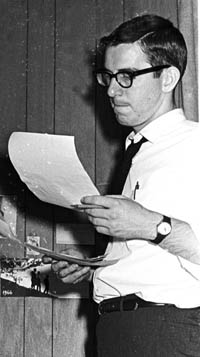What Was The Courier?
| One result of The Courier's professional journalism was to embarrass local news outlets into covering stories they were uncomfortable with reporting and to force the correspondents from national and international news organizations to report stories they otherwise would have missed. Robert Ellis Smith was a journalist who used his legal training to report on privacy issues. He was a frequent speaker, writer, commentator and Congressional witness on privacy. A 1962 graduate of Harvard College, he was editor of the Southern Courier in 1965 and 1966. Smith received his law degree from the Georgetown University Law Center in 1976. Beginning 1974, he published Privacy Journal, a monthly newsletter based in Providence, R.I. Smith was the 2002 Clifford J. and Virginia Foster Durr Lecture series lecturer at Auburn University, Montgomery. He died July 25, 2018. |
 |
| Bob Smith editing the Courier in the 1960's. |
Based in Montgomery, Alabama, the newspaper recruited a biracial staff of reporters, photographers, circulation sales people, and others to provide balanced coverage of the civil rights movement for readers on all sides of the controversial issues of the day. One result of the Courier's professional journalism was to embarrass local news outlets into covering stories that they were uncomfortable with reporting and to force the scores of correspondents in the South from national and international news organizations to report stories they otherwise would have missed. Its reporting and photojournalism were regarded at the time as superior.
Each of the staffers was committed (1) to become part of their communities and not engage in "drive-by" attempts at social change; (2) to use their professional skills as journalists, more than their skills as community organizers or dissenters, to effect social change; and (3) to produce a quality newspaper that did far more than reach only those who agreed with the pro-civil rights perspective of its editors. We achieved each of those goals. We also sought to aid African-American young people in the South develop journalism skills.
The paper ceased publication in 1968 when opposition to the War in Vietnam attracted the attention of many donors and when local and national news media finally covered essential stories about race relations in the South.
But many Courier staff persons went on to be the vanguard of reporters and editors in the so-called underground press of the 1970s - weekly newspapers established as foils or gadflies to the established newspapers and radio and TV stations in small and large cities. African-American staff members also became part of the vanguard of minority-group news professionals first hired in the late 1960s and 1970s. In its three years, the Courier was a focal point in the transition of a church-based, desegregation-based movement to an assertive, more urban black empowerment movement.
For 40 years, the staff members had never met since the intense experiences of the 1960s. News reporters and race-relations scholars have not had an opportunity to question them and document their role in the civil rights movement of the 1960s. Accounts of the civil rights movement rarely mention the Courier. But journalists who covered the movement know it well.
